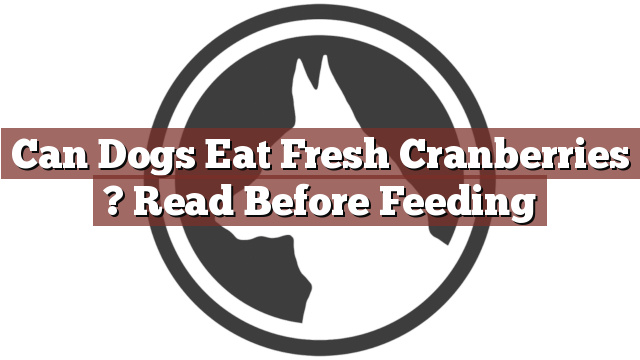Understanding Your Dog’s Dietary Needs
As responsible pet owners, it is crucial to understand the dietary needs of our furry friends. Feeding them a balanced diet that meets their nutritional requirements is essential for their overall health and well-being. While dogs primarily thrive on a diet of meat, they can also benefit from incorporating certain fruits and vegetables into their meals. However, it is important to be cautious and well-informed before introducing any new food into your dog’s diet.
Can Dogs Eat Fresh Cranberries? Read Before Feeding
Can dogs eat fresh cranberries? The answer is yes, dogs can eat fresh cranberries in moderation. Cranberries are packed with nutrients that can offer health benefits to our canine companions. They are rich in antioxidants and contain vitamin C, fiber, and manganese. These properties can support your dog’s immune system, aid in digestion, and promote urinary tract health.
That being said, it is important to note that some dogs may have difficulty digesting cranberries. The high acid content in cranberries can potentially cause an upset stomach or gastrointestinal issues for certain dogs. Additionally, some dogs may be allergic to cranberries or have underlying medical conditions that could be negatively impacted by their consumption. Therefore, it is always advisable to consult with your veterinarian before introducing cranberries or any new food into your dog’s diet.
Pros and Cons of Feeding Cranberries to Your Dog
Feeding fresh cranberries to your dog can have both pros and cons. On the positive side, cranberries provide a good source of vitamins and antioxidants that can contribute to your dog’s overall health. The antioxidants in cranberries help neutralize harmful free radicals and support immune function. The fiber content promotes healthy digestion and can be particularly beneficial for dogs with constipation or diarrhea.
However, there are also potential drawbacks to feeding cranberries to your dog. As mentioned earlier, some dogs may have difficulty digesting cranberries and may experience digestive upset. The tart taste of cranberries may not be appealing to all dogs, and they may simply refuse to eat them. Additionally, cranberries should always be fed in moderation as too much can cause stomach upset, diarrhea, or even bladder stones due to their high oxalate content.
Conclusion: Considerations for Feeding Fresh Cranberries to Your Dog
In conclusion, dogs can safely consume fresh cranberries, but it is important to approach their inclusion in your dog’s diet with caution. Before introducing cranberries to your furry friend, it is crucial to consult with your veterinarian to ensure it is suitable for your dog’s specific needs. If your veterinarian gives the green light, start by offering small amounts of cranberries and observe your dog for any adverse reactions. Always feed cranberries in moderation and discontinue if any digestive issues arise. By doing so, you can provide your dog with potential health benefits while minimizing any potential risks.
Thank you for taking the time to read through our exploration of [page_title]. As every dog lover knows, our furry friends have unique dietary needs and responses, often varying from one canine to another. This is why it's paramount to approach any changes in their diet with caution and knowledge.
Before introducing any new treats or making alterations to your dog's diet based on our insights, it's crucial to consult with a veterinarian about [page_title]. Their expertise ensures that the choices you make are well-suited to your particular pet's health and well-being.
Even seemingly harmless foods can sometimes lead to allergic reactions or digestive issues, which is why monitoring your dog after introducing any new food item is essential.
The content provided here on [page_title] is crafted with care, thorough research, and a genuine love for dogs. Nevertheless, it serves as a general guideline and should not be considered a substitute for professional veterinary advice.
Always prioritize the expert insights of your veterinarian, and remember that the health and happiness of your furry companion come first.
May your journey with your pet continue to be filled with joy, love, and safe culinary adventures. Happy reading, and even happier snacking for your canine friend!

